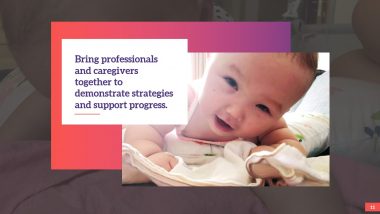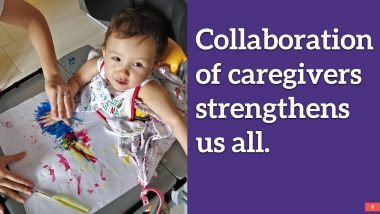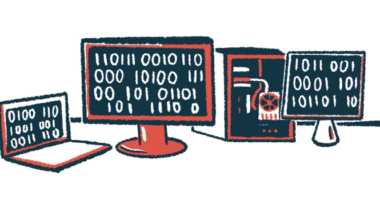Improving Caregiver Collaboration Through Virtual Meetups
Connecting with other rare disease parents is vital, this columnist has learned

When our family’s rare disease journey began four years ago, we felt alone. Part of the reason was that there wasn’t much information available about our daughter’s condition. But, candidly, it was also because we chose to shut ourselves off from the world.
Recently, my wife, Judy, and I held an online caregiver meetup to collect data about caring for a child with aromatic l-amino acid decarboxylase (AADC) deficiency. As founders of the newly formed nonprofit organization Teach RARE, we wanted to use our gathered information to create a series of free, online, supportive events for caregivers. Each event will focus on a different type of therapy and incorporate educational goals. It’s an opportunity for caregivers to connect with healthcare professionals.

A slide from Richard’s presentation features his daughter and the goal of the online series. (Courtesy of Richard E. Poulin III)
As educators, Judy and I know that to develop a successful lesson plan, you must know your student. The students, in this case, are the caregivers of children with rare diseases. We wanted to know about the troubles they faced, where they went for information, and what kind of support they needed.
The importance of collaboration
The meetup was informative and brought together parents from different parts of the world. While it was very much an open session, I wanted the dialogue to be balanced. Telling other parents that they’re free to talk does not result in automatic conversations. I know this because I used to be that parent who didn’t want to share.
It can feel strange to open up, especially to new parents who are just learning about the rare disease world. You may feel vulnerable and unsure of yourself. That’s why I always try my best to be a role model. How can I expect others to talk if I don’t?
I started a conversation by talking about my family’s story and our goal for this year: We want to motivate other families to share their stories and create awareness in their own way.

Richard’s daughter, Rylae-Ann, is featured on the slide that discusses the importance of collaboration among rare disease parents. (Courtesy of Richard E. Poulin III)
I failed to realize early in my journey that by opening up and sharing, I would build collaboration. Collaboration is the secret ingredient to creating something greater than what can be achieved independently. It is the ultimate combination of skills, passions, and knowledge. With collaboration, it’s possible to produce long-term and meaningful change.
I realized that as others learned from me, I was learning from others. All of our children will benefit and make more progress if we work together. The more I dropped the bravado, the more collaboration was able to enter and help us achieve results.
I didn’t openly discuss my daughter’s struggle for almost three years. However, during an AADC deficiency parent meetup, I met a family who spoke about how their child with AADC deficiency had passed. Their story captured my heart and inspired me. During that meeting, I decided to open up.
When Judy and I reflect on moments of success along our journey, it’s hearing from other parents that has always motivated us. Our objective is to create unity by joining caregivers together and creating collaboration within our rare disease community.
Note: AADC News is strictly a news and information website about the disease. It does not provide medical advice, diagnosis, or treatment. This content is not intended to be a substitute for professional medical advice, diagnosis, or treatment. Always seek the advice of your physician or other qualified health provider with any questions you may have regarding a medical condition. Never disregard professional medical advice or delay in seeking it because of something you have read on this website. The opinions expressed in this column are not those of AADC News or its parent company, Bionews, and are intended to spark discussion about issues pertaining to aromatic l-amino acid decarboxylase deficiency.








Leave a comment
Fill in the required fields to post. Your email address will not be published.